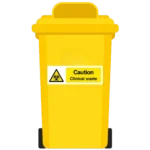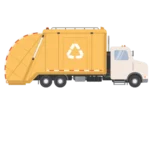Clinical waste collection
Save money on your clinical waste collections today
Just enter your business postcode…
Save money on your clinical waste collections today
Just enter your business postcode…
Start saving now
UK hospitals and clinics have a legal duty of care to safely manage and dispose of hazardous medical waste. Having the right waste partner to help you navigate the risks associated with handling clinical waste is essential.
Our waste experts are here to assist you in finding the best clinical waste quotes in your area. Start by entering the postcode of your clinic or hospital above.
This guide to clinical waste collections offers a general overview of NHS and other regulations concerning the management of waste in healthcare facilities. Clinical waste management is a strictly regulated process, and businesses are legally obligated to handle it correctly.
When developing procedures for managing clinical waste, engaging a clinical waste professional firm to conduct a commercial waste audit is indispensable. A clinical waste audit provides:
Clinical waste disposal providers typically include a waste audit as part of their onboarding process.
Clinical waste collection providers are medical waste experts who can assist healthcare institutions in safely and effectively disposing of their clinical waste.
We’ve summarised the services offered by our clinical waste collection providers:

Before agreeing to collect clinical waste from a hospital or clinic, most waste providers conduct a pre-acceptance audit to understand the clinical waste disposal requirements of your business.

Based on the pre-acceptance waste audit, a clinical waste collection firm will provide suitable storage bags, containers, and labels to help your business safely segregate and store clinical waste.

Clinical waste collection firms operate fleets of waste vehicles with regular routes, collecting clinical waste and delivering it to dedicated clinical waste Energy Recovery Facilities for disposal.

The clinical waste collection experts will be able to offer expert advice on procedures and the waste transfer notes required to comply with the NHS’s Health Technical Memorandum – 07-05 on healthcare waste.

Expert clinical waste firms are available to provide guidance on clinical waste prevention and minimisation in line with the waste hierarchy. The best firms offer on-site training for your staff members.
Clinical waste is legally defined by the Controlled Waste Regulations 2012 as waste produced from healthcare activities that are contaminated with or contains:
Most clinical waste produced by healthcare institutions is classified as hazardous waste.
Here is a summary of the waste classification codes associated with the UK healthcare sector.
| Waste Code | Description |
|---|---|
| 18 01 01 | Sharps (except 18 01 03) |
| 18 01 02 | Body parts and organs including blood bags and blood preserves (except 18 01 03) |
| 18 01 03 | Wastes whose collection and disposal is subject to special requirements in order to prevent infection |
| 18 01 04 | Wastes whose collection and disposal is not subject to special requirements in order to prevent infection (for example dressings, plaster casts, linen, disposable clothing, diapers) |
| 18 01 06 | Chemicals consisting of or containing hazardous substances |
| 18 01 07 | Chemicals other than those mentioned in 18 01 06 |
| 18 01 08 | Cytotoxic and cytostatic medicines |
| 18 01 09 | Medicines other than those mentioned in 18 01 08 |
| 18 01 10 | Amalgam waste from dental care |
Source: Gov.uk Waste Classification Technical Guidance
Clinical waste bins are utilised to segregate and store clinical waste at the point of production.
These smaller waste bins must then be regularly moved to a secure storage area, ready for collection by a licensed clinical waste collection provider.
In this section, we will summarise the NHS’s guidelines for managing clinical waste in a healthcare setting, as these clearly explain how your bin system should be managed.
The NHS Memorandum of Safe and Sustainable Management of Healthcare Waste stipulates the following for collecting and storing clinical waste:
💡 The regulations governing clinical waste storage differ across England and Wales, Scotland, and Northern Ireland. Here is a link to our guide on devolved waste regulations.
Used needles present a waste management challenge in the clinical setting, as they can easily puncture the skin and are often contaminated with biological or chemical materials.
Sharps waste must be disposed of exclusively in sharps bins. These disposal containers are rigid and specifically designed to safely store used needles, syringes, and lancets.
Sharps disposal containers must be accessible at the point of use, enabling healthcare professionals to dispose of needles immediately after use.
Sharps bins should be sealed and moved to storage once they are three-quarters full.
Guidance from the NHS’s Health Technical Memorandum – 07-05 establishes the following rules for handling clinical waste:
Hospitals and clinics are legally responsible for ensuring that clinical waste is properly packaged and labelled prior to collection by a licensed commercial waste provider.
Commercial waste collection providers are legally obligated to refuse the collection of any clinical waste that has not been adequately labelled.
A clinical waste collection provider will supply a large commercial waste bin for each category of clinical waste produced by a healthcare facility. These bins must be stored in a secure location that is accessible to your waste collection providers.
A commercial waste disposal firm will issue a waste transfer note when collecting clinical waste from UK businesses. These specialist waste collection firms dispose of clinical waste in compliance with UK regulations, typically through one of the following methods:

Energy can be recovered from certain classes of clinical waste at an Energy Recovery Facility, in line with the Environmental Agency’s guidance.

Disposal to a sewage treatment plant is permissible with trade effluent permission from the local wastewater company.

Where energy recovery is not feasible, landfill serves as the final option for the long-term disposal of clinical waste.
Our commercial waste experts answer those commonly asked questions regarding clinical waste collection.
The proper disposal of clinical waste is crucial for several reasons, but primarily, it safeguards healthcare workers, patients, and the wider community from infections, injuries, and diseases. Clinical waste frequently contains potentially harmful microorganisms that can propagate disease if not managed correctly.
The comprehensive laws and regulations governing the management of clinical waste are designed to protect healthcare workers, the community, and the environment from the risks associated with poorly managed clinical waste disposal.
The clinical waste collection providers we collaborate with are all obligated to comply with the waste hierarchy, which aims to minimise the use of landfills in clinical waste disposal.
Recently, waste disposal providers have made significant efforts to reduce carbon emissions associated with clinical waste by utilising energy recovery facilities more extensively.
We can offer clinical waste quotes for the majority of locations in the UK, including Camden, Cornwall and Cardiff.
While some trusted clinical waste collection providers offer services only locally, we can help you find the best quotes in your area. Enter your postcode above to start.